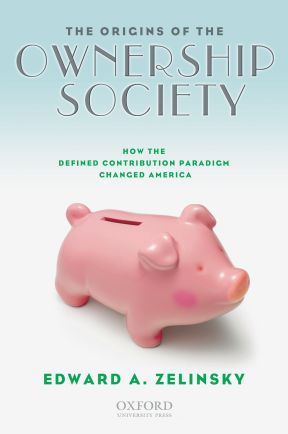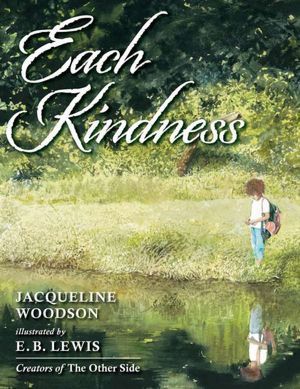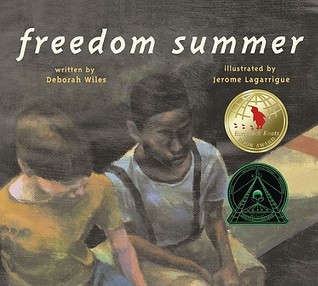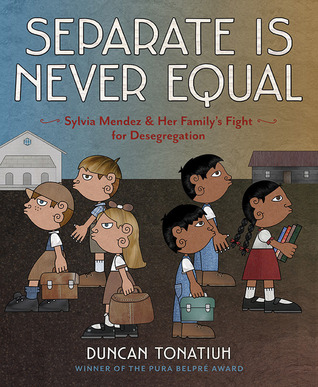Title: New Shoes Written by: Susan Lynn Meyer Illustrated by: Eric Velasquez Published by: Holiday House, 2015 Themes/Topics: Shoes, Segregation, Discrimination, African American Interest, Human & Civil Rights, Fairness, Justice & Equality, Determination, Genre: Historical fiction Suitable for ages: 5-8 Opening: My cousin Charlotte … Continue reading
Add a CommentViewing: Blog Posts Tagged with: fairness, Most Recent at Top [Help]
Results 1 - 20 of 20
Blog: Miss Marple's Musings (Login to Add to MyJacketFlap)
JacketFlap tags: Fairness, Determination, Discrimination, Shoes, NEW SHOES, Segregation, Eric Velasquez, African American Interest, WNDB, Diversity Reading Challenge 2015, 2015 Diversity Reading Challenge, Susan Lynn Meyer, Human & Civil Rights, Justice & Equality, Add a tag
Blog: A Year of Reading (Login to Add to MyJacketFlap)
JacketFlap tags: fairness, Empathy, 10 for 10 Picture Books, Add a tag
Thank you to Cathy (@cathymere) at Reflect and Refine and Mandy (@mandyrobek) at Enjoy and Embrace Learning for inventing and now hosting the FIFTH annual Picture Book 10 for 10 event. It's always fun to see what books everyone chooses and how much we all spend!!
I've shared my beginning of the year favorite read-alouds for community building with so many teachers that it's time to find a new group of books to use! Thank you #pb10for10 for helping me find 10 titles that will get my students and me thinking about issues of fairness. I'm excited to have a mixture of contemporary fiction, historical fiction, folktales, music, and nonfiction. I'll supplement these books with poetry on the same theme.
I found this image without attribution on another blog. This will be our first "text" to "read" and discuss as we think about fairness and justice.
Hopefully we will never miss the chance to be kind
to someone in our world.
Is it okay to make a situation more fair by using trickery?
With this book, we'll begin to connect fairness and Civil Rights. I'm hoping to read aloud the Kindle edition of Wiles' Revolution (The Sixties Trilogy)
by Debbie Levy
illustrated by Vanessa Brantley-Newton
The story of this classic Civil Rights song will give us the "So What Now?" in this picture book unit. What will we do to work towards more fairness in our classroom, our building, our community, and our world?
Blog: The Children's Book Review (Login to Add to MyJacketFlap)
JacketFlap tags: Friendship, Fairness, Picture Books, Author Showcase, Poetry & Rhyme, Baboon Books, Balloon Books, Sarah Mostyn, Steven Mostyn, Add a tag
The Blue Baboon in the Big Balloon by Sarah & Steven Mostyn is well suited as a read aloud book or for young readers.
Add a CommentBlog: Utah Children's Writers (Login to Add to MyJacketFlap)
JacketFlap tags: fairness, writing wednesday, Add a tag
Zen notion of the monkey brain. The first image of a monkey brain that springs to mind is likely that of a frenzied simian bouncing around the cage of desires in which Buddhists would say we are trapped. There's clearly good writing advice to be mined from this image about creating a writing space, whether virtual or actual, where one can be free from distractions.
But I found another, intriguing association with the phrase, "monkey brain."
I came across a study that showed brown capuchin monkeys have a strong sense of fairness. The monkeys were trained to trade pebbles with researchers for food, usually pieces of cucumber but sometimes grapes. If pairs of monkeys made the trade and one of them got a better deal (i.e., grapes), the other would throw a fit.
Does this sound familiar?
What if I replace, "monkey," with, "writer," and, "researcher," with, "publisher?"
More familiar now?
This isn't a rehash of my advice to, "keep your eyes on your own test," though the points are related. No, this is about your basic expectations.
The fact of the matter is that the business of publishing is grossly unfair.
Your options are to throw a fit and go sulk in the far corner of your cage, or to transcend your monkey brain--particularly the part that keeps oh-so-careful track of how fair the situation is--and keep writing.
Deren blogs daily at The Laws of Making.
Blog: Critical Literacy in Practice - CLIP Podcast (Login to Add to MyJacketFlap)
JacketFlap tags: Children's Books, Podcast, critical literacy, Literacy, Fairness, Disney, vivian vasquez, Classroom Practice, young children, disney babies, Add a tag
In this show: Disney Babies Participate in the show: Call in comments and/or show ideas CLIP Voicemail Line : (703) 651-CLIP(2547) Email: [email protected] Twitter/FB clippodcast Music: Hold My Hand by Matthew Cambell Produced by Andy Bilodeau Show Transcript: The Disney Baby has been born. By now you have probably heard that the Disney corporation has launched a new line of products geared towards newborn [...]
Blog: OUPblog (Login to Add to MyJacketFlap)
JacketFlap tags: fairness, Sociology, Business, Politics, Current Events, feminism, sexism, discrimination, Finance, *Featured, equal pay act, mariko chang, paycheck fairness act, shortchanged, women in the workplace, chang, mariko, paycheck, wages, remedies, Add a tag
By Mariko Lin Chang
Last week, the Senate Republicans defeated the Paycheck Fairness Act. The bill would have strengthened the Equal Pay Act by providing more effective protections and remedies to victims of sex discrimination in wages, including prohibiting employers from retaliating against employees who discuss their wages with another employee, requiring employers to prove that wage differences between women and men doing the same work are the result of education, training, experience, or other job-related factors, and providing victims of sex discrimination in wages the same legal remedies currently available to those experiencing pay discrimination on the basis of race or national origin.
Was the bill perfect? Probably not (few, if any bills could be considered perfect). But the Republican senators threw the baby out with the bath water.
I think most members of the Senate believe that women should be paid the same amount as men for doing the same job. Yet many did not support the Paycheck Fairness Act. Perhaps their reluctance had to do with partisan politics or opponents’ arguments that it would be bad for business. Regardless of their reasons for not supporting the bill, if bill had been about pay discrimination on the basis of race, I think it would have passed long ago because the political fall-out for failing to oppose racial discrimination is much steeper than failing to oppose sex discrimination.
Why is it OK to continue to allow pay discrimination against women? Why do we accept this as a fact of life? And why should victims of sex discrimination in wages be denied the same legal remedies as victims of racial discrimination?
Issues pertaining to sex discrimination have been relegated to the second-class status of “women’s issues.” And because “women’s issues” have become imbued with divisive issues such as abortion, it has become more politically and socially acceptable to oppose legislation promoting the rights of women–even if it’s the right to equal pay.
Another reason the Paycheck Fairness Act experienced push-back is that many believe pay inequities are a result of women choosing jobs that are more compatible with family responsibilities or of women having less job experience because of years out of the labor force. But the Act did not state that women and men should receive the same pay regardless of work experience, occupation, or level of education. The Act acknowledged that pay differences based on these factors are not discrimination.
The Paycheck Fairness Act was about women receiving the same pay as men for doing the same work. It’s time we hold our Congressional representatives to the national principle that everyone (regardless of gender, race, national origin, or religion) deserves equal pay for equal work.
Mariko Lin Chang, PhD, is a former Associate Professor of Sociology at Harvard University. She currently works with universities to diversify their faculty and also works as an independent consultant specializing in data analysis of wealth inequality in the US. Chang is the author of Shortchanged: Why Women Have Less Wealth and What Can Be Done About It.
Blog: Mad Woman in the Forest (Login to Add to MyJacketFlap)
JacketFlap tags: fairness, health care, Add a tag
This is how we can have a rational conversation about health insurance. Ask yourself and everyone you know three questions:
1. What percentage of your annual income do you spend on health care costs?*
2. How many people does that cover?
3. What do you think is a reasonable percentage?
My husband and I (both self-employed) spend about 20% of our income on health insurance and medical costs. How about you?
One more question: Should all Americans have access to affordable health care like we have access to water, electricity, & education?
Here is what I think.There was a time in America when education was totally private: people who wanted their children to go to school paid for it. Eventually, Americans decided that public education was such an incredible public good, i.e., something everyone benefits from, that we moved to a taxpayer-funded system of education, open to all. And, of course, there are still private schools for families who want to make that choice.
There was a time in America when clean water and electricity were available only to the wealthy. The poor pulled up water from wells or dipped buckets into dirty rivers, and lit their homes with candles and lanterns because they had no choice. (My father-in-law, who died in July, did not have electricity on his street until he was 10 years old.)
Our fellow citizens argued and grumbled, but eventually decided that it was a benefit to the entire nation if all Americans had access to water and electricity. So programs were put in place, funded in part by taxpayers and in part by consumers, to make that happen.
Now the debate has turned to health insurance. My grandparents did not have it when they were young. In the middle of the last century, it became a widespread job benefit, and programs were put in place to insure the vulnerable; elderly, poor and disabled people. (The other place you are guaranteed health care is in prison.)
In the past three generations, insurance has moved from the privilege of the rich to something that most Americans consider a basic part of life, like education, electricity, and water.
I am all about capitalism. I love capitalism. I am a small business owner and so is my husband and it's working for us. Almost.
One of our three adult kids doesn't have insurance. Another one will lose her coverage in three months. My friends who are out of work have no insurance. People who might take the plunge into small business ownership don't because they are afraid to leave their job and give up their health insurance. Americans die and suffer needlessly every day because health care in this country has become a trip to the roulette wheel.
The time has come for us to agree that all Americans deserve basic health care coverage - the same for all people in all states. If you want a fancier program with bells and whistles, you can pay extra. The insurance companies have to buck up. When your service is considered a public good - a public necessity - you have to trade in outrageous short-term profits for long-term secure cash flow.
*Health care costs = insurance premiums, co-pays, out-of-pocket expenses
PS - Check out this comparison of our system to Japan's.
PPS - Are you sure that what you pay for will be enough? According to a
Blog: OUPblog (Login to Add to MyJacketFlap)
JacketFlap tags: fairness, Law, new york, congress, taxes, national, Zelinsky, employer, telecommuter, telecommuting, telecommuters, nonresident, york’s, “convenience, telecommute, taxing, Add a tag
Edward A. Zelinsky is the Morris and Annie Trachman Professor of Law at the Benjamin N. Cardozo School of Law of Yeshiva University. He is the author of The Origins of the Ownership Society: How The Defined Contribution Paradigm Changed America. In this article, Professor Zelinsky criticizes New York’s “convenience of the employer” doctrine for double taxing telecommuters at a time when public policy should be encouraging, rather than hindering, telecommuting. He calls on Congress to pass the Telecommuter Tax Fairness Act to stop such double taxation. Read his past OUPblog posts here.
A gallon of gas today costs $4.00 or more in most parts of the country. The public is concerned, as perhaps never before, about the impact of human activity on the global environment. In this setting, telecommuting has emerged as an environmentally sensitive and economically sensible lifestyle.
By permitting individuals to work at home for part (often much) of the work week, telecommuting removes telecommuters’ cars from the roads, thereby reducing traffic congestion, gas consumption, and automotive pollution. Telecommuting from home also opens job opportunities for persons for whom a conventional, daily trip to the work place is difficult or undesirable – parents’ of small children, disabled individuals, persons who live far from major employment centers. Telecommuting allows employers to hire these individuals who might otherwise withdraw from the labor force.
of the work week, telecommuting removes telecommuters’ cars from the roads, thereby reducing traffic congestion, gas consumption, and automotive pollution. Telecommuting from home also opens job opportunities for persons for whom a conventional, daily trip to the work place is difficult or undesirable – parents’ of small children, disabled individuals, persons who live far from major employment centers. Telecommuting allows employers to hire these individuals who might otherwise withdraw from the labor force.
For all of these reasons, public policy should encourage, or at least not hinder, the growth of telecommuting. Unfortunately, the tax policies of the State of New York discourage telecommuting by double taxing out-of-state individuals who telecommute for New York employers from their out-of-state homes. In particular, New York’s so-called “convenience of the employer” rule imposes nonresident New York income taxes on out-of-state telecommuters on the days they work at home, often hundreds – if not thousands – of miles from New York.
Consider, for example, the recent case of Mr. R. Michael Holt, a human resources compensation consultant who lives in Naples, Florida. In 1999, Mr. Holt worked at his home in Florida for the New York offices of KPMG, LLP and William M. Mercer, Inc. Under the employer convenience rule, New York imposed nonresident income taxes upon Mr. Holt for the income he earned working at home in the Sunshine State, thousands of miles from New York.
When the state in which a telecommuter lives also imposes an income tax, the result of New York’s tax policy is double taxation as the out-of-state telecommuter who works at home must pay tax both to New York and to the state in which she lives. The result is an unfair and inefficient tax penalty for telecommuting, namely, the double taxation of the income earned by the telecommuter on the days she works at her out-of-state home.
New York’s policy is bad, not only for out-of-state persons who telecommute to the Empire State, but potentially for telecommuters throughout the nation and for the employers who employ such telecommuters. If New York can get away with double taxing out-of-state telecommuters, other states will be tempted to emulate New York and likewise tax nonresident telecommuters who work at their out-of-state homes. The upshot will thus be double taxation of telecommuters nationwide when public policy should instead be supporting telecommuting.
Unfortunately, New York’s courts have refused to stop New York’s double taxation of nonresident telecommuters on the days such telecommuters work at their out-of-state homes. In Huckaby v. Tax Appeals Tribunal, New York’s highest court, by a narrow but decisive margin of 4-3, upheld New York’s income taxation of Thomas Huckaby on the days Mr. Huckaby worked at his home in Nashville, Tennessee.
Pending in Congress is legislation which would prevent New York and other states from using the “convenience of the employer” doctrine or any similar artifice to double tax nonresident telecommuters on the days they work at their out-of-state homes. The Telecommuter Tax Fairness Act has attracted bi-partisan support from members of Congress who recognize the importance of telecommuting-friendly public policy.
It is unreasonable for New York to punish telecommuting by double taxing workers who telecommute for New York employers from their out-of-state homes, particularly at a time when sound public policy should encourage telecommuting. There is, however, no sign that New York will alter its irrational “convenience of the employer” rule. Congress should accordingly adopt the Telecommuter Tax Fairness Act to eliminate the ability of New York and other states to double tax nonresident telecommuters on the days they work at their out-of-state homes.
Blog: Critical Literacy in Practice - CLIP Podcast (Login to Add to MyJacketFlap)
JacketFlap tags: children, Podcast, Fairness, second grade, Classroom Practice, 100kids, Social Action, Baltimore Aquarium, Carol Felderman, Add a tag
In This Show: 2nd graders take social action to go on a trip to the Baltimore Aquarium Learning with real world effects Podcasts Mentioned: 100% KIDS Let me know where you are: Click on ‘Join the CLIP Frappr Map’ in the menu bar. Post a comment: Click the comment button below or leave a voice mail by clicking ‘leave me a message’ [...]
Blog: Critical Literacy in Practice - CLIP Podcast (Login to Add to MyJacketFlap)
JacketFlap tags: children, Children's Books, Podcast, Family, Fairness, heather jopling, alternative lifestyle, javascript:addTag(andrea ross), same sex parents, Add a tag
Today I have for you part one of a two part conversation with Heather Jopling author of wonderful books on same sex parents and alternative lifestyles, specifically Ryan’s Mom is Tall, Monicka’s Papa is Tall, and The Not-So-Only Child. Today my conversation with Heather focuses on the story behind the children’s books she has written [...]
Blog: Critical Literacy in Practice - CLIP Podcast (Login to Add to MyJacketFlap)
JacketFlap tags: Podcast, Fairness, Canada, Reference, myths, Conference, Stereotyping, Classroom Practice, What is Critical Literacy, Kindergarten and Pre-school, Language Use, Social Action, Rising Up, injustice, Petitions and Surveys, Hawaii, International Reading Association, Add a tag
On Today’s Show: Tonight’s show is part two of a three part series, which was recorded on the beautiful island of Hawaii, at the International Reading Association’s Regional Conference which was held there two weeks ago. Negotiating Spaces for Critical Literacy Social Action in a JK Classroom Upcoming Shows NOTE: Some of the audio had to be re-recorded on [...]
Blog: Just One More Book Children's Book Podcast (Login to Add to MyJacketFlap)
JacketFlap tags: review, children, Podcast, Ages 4-8, Generosity, Picture book, Bullying, Fun, Life Skills, Cartoony, Hilarious, Humour, book, Man, age4 8, economics, ethics, fairness, greed, law, Add a tag
 Author: Robin Tzannes
Author: Robin Tzannes
Illustrator: Korky Paul
Published: 2005 Oxford University Press
ISBN: 0192722697 Chapters.ca Amazon.com
Argh!!! Another fabulous book that’s out of print. I sure hope you can find this great book at your local library.
This hilarious and thought-provoking tale of greed gets squeals of delight time after time.
Tags:age4 8, book, children, economics, ethics, fairness, greed, humour, law, podcast, reviewage4 8, book, children, economics, ethics, fairness, greed, humour, law, podcast, reviewBlog: Critical Literacy in Practice - CLIP Podcast (Login to Add to MyJacketFlap)
JacketFlap tags: children, Podcast, life, Community, Family, celebration, Fairness, Parenting, Social Action, Rising Up, outreach, Add a tag
In This Show: A listener inspired episode. The Shakes Festival with Seven-Year-Old Lucy, Andrea and Mark Podcasts Mentioned: Just One More Book, Mostly News, Desperate Husbands AndyCast, Canadian Podcast Buffet, Electric Sky Special Thank You: Andrea and Mark, of Just One More Book and their daughter Lucy for providing material for this show. Thanks also to Charles Cadenhead [...]
Blog: Critical Literacy in Practice - CLIP Podcast (Login to Add to MyJacketFlap)
JacketFlap tags: Children's Books, Podcast, Community, music, Reading, Family, halloween, courage, Literacy, Fairness, Reference, Christmas, culture, Parenting, Disney, Classroom Practice, Valentines, Toronto, What is Critical Literacy, multimedia text set, media, Easter, power, Social Action, Rising Up, injustice, Handy Manny, Diwali, Free Resources, OISE, pumpkin, Ramadan, thanksgiving, Add a tag
On Today’s Show: A multi-media text set of children’s books and audio that focus on acts of courage and acts of kindness. Save Our School by the Children of Selsted Primary Si Se Puede, Yes We Can The Streets are Free Selavi and Radyo Timoun. IndyKids BabagaNewz Kids Can Make A Difference® (KIDS) Sage Tyrtle on Deamonte Love and schools in Louisiana [...]
Blog: Critical Literacy in Practice - CLIP Podcast (Login to Add to MyJacketFlap)
JacketFlap tags: Podcast, music, Fairness, Classroom Practice, media, Social Action, Rising Up, podsafe music, 7 Digital, adam curry, political song, protest, selsted, Add a tag
On Today’s Show: Save Our School : The Children of Selsted Primary Thank You To: Jeff Wood, Shannon Blaney, Wayne Serebrin, Yvonne Siu Runyan and Celia Oyler, for commenting on the show, contacting me regarding the show, or pinning my frappr map. And I also want to thank Allyn Kurin for the station ID. Congratulations To: Jeff Wood [...]
Blog: Critical Literacy in Practice - CLIP Podcast (Login to Add to MyJacketFlap)
JacketFlap tags: Podcast, Community, literacy, Fairness, school, education, social justice, Classroom Practice, elementary, classroom, Kindergarten and Pre-school, Social Action, injustice, Ramadan, audio, Celia Oyler, Add a tag
Teachers at work Behind the Scenes : A Ramadan Story On Today’s Show: A Ramadan Story by Celia Oyler: About a student teacher who took a chance and changed school for a number of children. Thank You to: Celia Oyler , for contributing to the show, as well as Mark, Andrea, Bayla, and Lucy for the station ID. [...]
Blog: Critical Literacy in Practice - CLIP Podcast (Login to Add to MyJacketFlap)
JacketFlap tags: Children's Books, Podcast, Family, childrens books, Fairness, school, education, What is Critical Literacy, bad words, elementary, classroom, audio, Negative Language, age equity, Add a tag
A Crossover Show with the Just One More Book Podcast on “Elbert’s Bad Word and the Social Construction of Text” On this show Elbert’s Bad Word as a focus for CLIP and Just One More Book (JOMB), JOMB promo. Click here to pop over to Andrea and Mark’s Just One More Book discussion regarding Elbert’s Bad Word, and [...]
Blog: Critical Literacy in Practice - CLIP Podcast (Login to Add to MyJacketFlap)
JacketFlap tags: Children's Books, Podcast, bullying, childrens books, Fairness, school, education, Stereotyping, Classroom Practice, What is Critical Literacy, elementary, classroom, critical literacy study group, audio, planets, Add a tag
Re-visiting Pluto and What Gets in the Way of Practicing Critical Literacy? In this show: Re-visiting Pluto’s Demotion and What gets in the way of creating spaces for critical literacy? Special Thanks To: Mitzi Lewison, Sarah VanderZanden, Amanda Vender, and Heather for commenting on the show. I also want to say thank you to Kathleen Fay for the [...]
Blog: Critical Literacy in Practice - CLIP Podcast (Login to Add to MyJacketFlap)
JacketFlap tags: Podcast, Community, childrens books, Fairness, school, education, Classroom Practice, Social Construction, What is Critical Literacy, media, elementary, questioning, classroom, critical literacy study group, Social Action, Rising Up, Petitions and Surveys, audio, planets, Add a tag
Questioning and Researching from the Start In this show: “Pluto, I Found Him!”, Taking Social Action in 2nd Grade. Special Thanks to : Carol Felderman for contributing to the show. Participate in the show. Subscribe and listen in iTunes XML Feed Location : feed://www.bazmakaz.com/clip/?feed=rss2 Let me know where you are by clicking on ‘Join the CLIP Frappr Map’ in the menu [...]
Blog: Critical Literacy in Practice - CLIP Podcast (Login to Add to MyJacketFlap)
JacketFlap tags: Podcast, music, Literacy, Fairness, school, education, social justice, Stereotyping, Classroom Practice, What is Critical Literacy, Language Arts and Reading, elementary, classroom, Kindergarten and Pre-school, Language Use, Social Action, Rising Up, injustice, Petitions and Surveys, audio, directory, NCLB, Add a tag
Welcome to CLIP! In this show; introducing the podcast and 3-5 year olds take social action. Music : Little by Little by Justin Gordon and Quit My Day Job by Geoff Smith Participate in the show. Subscribe and listen in iTunes XML Feed Location : feed://www.bazmakaz.com/clip/?feed=rss2 Let me know where you are by clicking on ‘Join the CLIP Frappr [...]
















I totally see what you're saying. The querying process really does make me feel like I have monkey brains!
I love your analogy. But, I'm not convinced the process is so much unfair, as much as our work doesn't measure up, or it's not what they (agents and editors) are looking for. It seems unfair, because we've put a lot of work into our writing, and have high expectations, but being subject to someone else's opinions of our work is the chance we take when we begin writing.